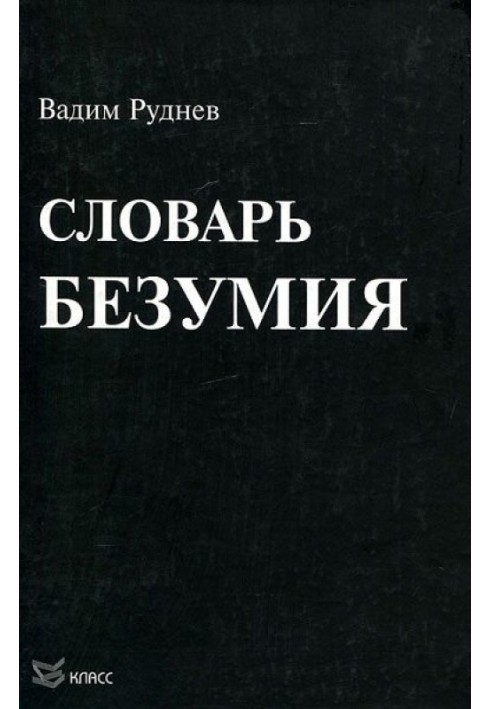Dictionary of Madness
 Instant download
Instant download
after payment (24/7)
 Wide range of formats
Wide range of formats
(for all gadgets)
 Full book
Full book
(including for Apple and Android)
“The Dictionary of Madness,” written by the Russian philosopher, the author of the intellectual bestseller “Encyclopedic Dictionary of the 20th Century,” is dedicated to comprehensive coverage of the most diverse aspects of human madness - hysteria, phobia, obsession, depression, paranoia, schizophrenia. He touches in detail on such problems as the etiology of delusions and hallucinations, dreams, subpersonalities, depersonalization; problem of human character; interaction with the idea of madness of such general philosophical categories as language, time, space, reality, love. Everyday objects - football, money, advertising, mushrooms - are subject to psychological interpretation. Madness is considered in the broad context of human culture, from which it is inseparable. At the same time, the Dictionary of Madness uses a variety of approaches and methods: clinical and existential psychiatry, classical psychoanalysis, characterology, analytical psychology by K.G. Jung, transpersonal psychology of S. Grof, analytical philosophy of L. Wittgenstein, theory of speech acts, semantics of possible worlds, structural linguistics and poetics. The book will be of interest not only to psychologists, psychiatrists, philosophers, psychotherapists, culturologists, but also to all intellectual readers interested in problems human personality, as well as to all lovers of interactive hypertext.
Contents: Apology of hysteria. Madness and reality. Crazy semiotherapy. Unconscious psychotic. Delusion of grandeur. Delusion and speech act. Delirium and language. Delirium of persecution. “In the bowl ". Vagina. "Winnie the Pooh". Wittgenstein Ludwig. The death drive and Stirlitz. Time and madness. Hallucinations. "Hamlet". "City Zero". The Grand Self. Mushrooms. Depersonalization. Depression. Depression and psychoanalysis. "Elizabeth Bam" “The Golden Age” and catatonia. Judushka Golovlev. Kafka. Kafka through the eyes of Jung, Shklovsky and Lacan. “God is possible all around.” “Ryaba Hen.” Love. Mother. Modalities. Monastyrsky Andrey. Neurosis and psychosis. Legs. Normal life.” Cloud in pants." "Oblomov". Obsessive discourse. Obsession and culture. Obsession and number. Father - Name of the Father. Paranoia. Perseveration. Spaces of madness. Mental death. Psychoanalysis of advertising. Psychoanalysis of football. Psychology of money. Psychotic discourse. Reality. Dream .Subpersonalities.Crazy Professor.The Essence of Madness.Schisis and polysemantic logics.Bodies of Madness.Phallus.Philosophy and Paranoia.Foucault Michel. “The history of madness in the classical era.” Characters. Characters and defense mechanisms. Characters and modalities. Schizotypal discourse. Schizotypal character. Schizotypal time. Schizophrenic discourse. Schizophrenia. Schizophrenia and the 20th century. “School for fools.” Daniel Schrober. Epileptoid body without organs. Epileptoid discourse. “I forgot the word, what I wanted to say...” Language and madness.
Data sheet
- Name of the Author
- Вадим Руднев Петрович
- Language
- Russian























